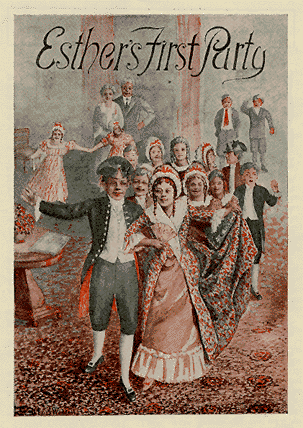Esther's First Party
by Mary Waddell
On returning from school one evening and finding her mother with eyes swollen from weeping, and a red mark across one cheek, Esther Fairdale burst into tears. "O, Mother!" she exclaimed, "Father has been drinking again, I know. Where is he now?"
"He has just gone with Alec Barnes and Tim Slocum," replied Mrs. Fairdale.
"I wish father would not go with such men. Only yesterday I heard a man call Mr. Slocum 'That old blear-eyed soak.' 0 dear! if I knew people talked that way about father I would be so ashamed I would not want to go to school. Well, l'Il never marry a man who drinks!"
"I sincerely hope not. But, Esther, I did not marry a drinking man. For the first two years your father and I were very happy; then he met Tim and Alec and though I remonstrated they influenced him to believe an occasional drink was harmless. As you know, all of them are drunkards now. If what we have did not belong to me instead of your father we would be as poor as the Barnes and Slocum families. He struck me today because I refused him money. It is difficult to find work, for people do not like to employ drinking men."
"Mother, it frightens me to think of what might happen to you if father could not get money for drink." Esther was crying again.
"My poor little girl!" said Mrs. Fairdale, drawing her close to her. "We must not give up hope that father will yet try to break this habit that binds him like a slave."
"What you say, Mother, reminds me of what the teacher said about Lincoln and Lee today. You know this is Lincoln's birthday. As you are a Southerner you doubtless know what a great temperance man General Lee was."
"Yes, he was one of the finest gentlemen in all the southland."
"Since father is a northerner he might be interested in Lincoln who, when a young man, made temperance speeches and persuaded people to sign a pledge that helped so many men to stop drinking. I committed the pledge today. Do you suppose .we could get father to sign it?"
"It would do no good for me to say more, but he might listen to you; suppose you try."
When Esther talked with her father, he said, "I am afraid it is too late, little girl; my appetite is stronger than my will power."
"God will help if you do your part," she answered. "If you sign the pledge you will not want to break your promise and that will help you keep it."
Mr. Fairdale could not sleep that night for thinking of what Esther had said. By morning he was ready to sign the pledge she wrote for him. Mrs. Fairdale wept for joy, and Esther's delight was a pleasure to behold. "I just feel like celebrating,"she said.
"How about a party," asked her mother.
"Just the thing!" cried Esther as she danced about the room. On, account of drunkenness in the home she had never given one. The time set for the great event was "Washington's Birthday."
Mrs. Fairdale sang as she prepared good things to eat, and as Mr. Fairdale helped with the decorations he seemed as happy as Esther. All the mothers readily agreed to help with the costumes.
When the time came, Esther and her cousin, Edgar Haddocks, dressed as George and Martha Washington, stood at the door and received their guests in a very formal manner, and later led in a grand promenade about the house. Hal Evans and Tom Turner, too bashful to wear costumes, looked on at first, but they soon joined the parade feeling sorry they had not "dressed up."
"Ain't we havin' the bestest time?" said Ada, one of the Baker twins, as she flourished her fan.
"Hurry up," said Addie, "We're gettin' behind." In front of the twins were Billy Carl and Sadie Campbell, Madge Phillips and James Patterson always found time to argue, while Harry Carroll, walking with Theresa Siders, was so excited he started to sing. Clarence Holmes and Carrie Mays kept close to George and Martha. Being so tall, Anne Sheridan felt justified in marching with more dignity than the others. A gayer crowd never celebrated George's birthday. There were games old and new in which Mr. and Mrs. Fairdale took an active part. Later in the dining room so beautifully decorated with flags, a wonderful feast was served. When no one could eat more, Martha arose and making an old-fashioned curtsy, said:
"When George was a boy, a tiny little boy
And a tiny little hatchet had he,
A cherry tree stood all ready to cut,
just as handy as handy could be.
"Sometimes when a boy's in a tight little place
He will find he can easily lie;
But when it was asked, 'Who damaged the tree?'
George answered quite promptly, ' 'Twas I.,
"The truth, it is a wonderful thing,
Yet lightly 'tis treated each day.
How many a boy who'd President be
Has fallen along the way!"
Making a low bow, George then arose and replied:
Tis true that George was a wonderful boy
And a wonderful man was he;
We'll always remember his truthfulness,
And the hatchet and cherry tree."Now a man is only half a man
When a wife has he, 'tis said;
But she has never been called the foot
E'en though he's called the head."O, here's to George, the truthful man!
But let us not forget
That Martha, as his better half,
Did help him some-you bet!"
As it was now quite late, the guests were soon on their way home, talking as they went about the great time they had spent. Later, when his little girl had fallen asleep, Mr. Fairdale stole into her room and kissing her, knelt by the bed; there he renewed his vow never to drink again, asking God to help him keep it and thanking Him for such a dear child as Esther.
---
Published by the Lincoln-Lee Legion, Westerville Ohio
Copyright, 192l. The American Issue Publishing Co.
A hard copy of this story can be found in the Anti-Saloon League Collection at the Westerville History Museum.
About the League
Museum Hours
Monday-Saturday: 9am-6pm
Closed on Saturday: 1-2pm
Closed on Sunday









